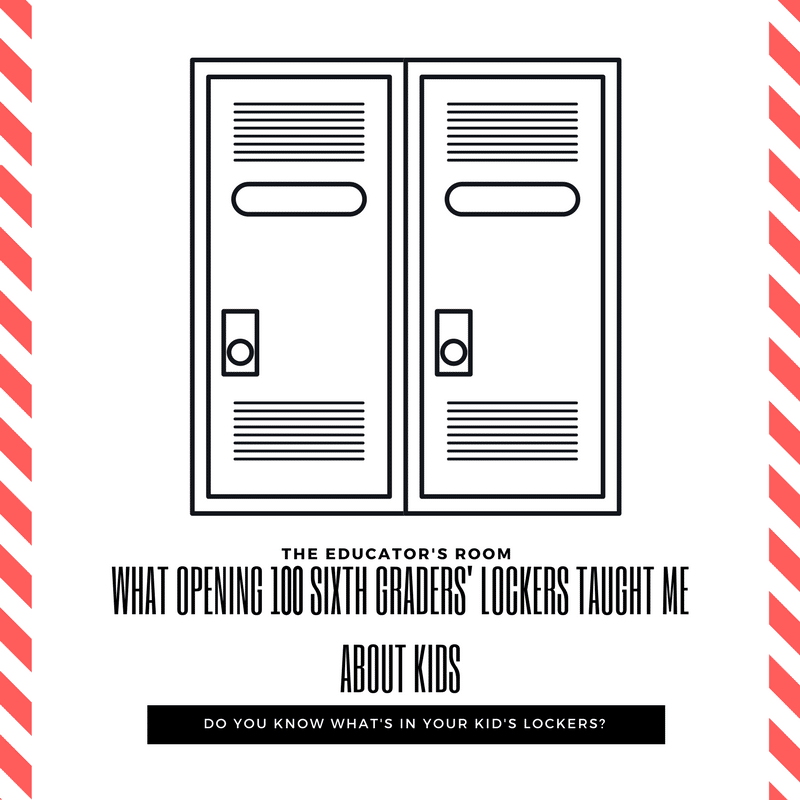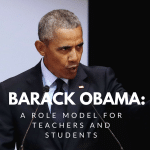She was running late for the departing Friday bus. I saw her as she laid there on the floor, sobbing, as other staff members patiently held 100 buses to send the nearly 800 students home for the weekend.
“I want my mommmmmmy!” She wailed, with the tears waterfalling down her face. Here lay the sister of a former student, all four-foot, six-inches of her, with her brown hair collecting the paper fragments on the floor as it jostled back and forth.
“Well, you’re not going to get your mommy until we get you into your locker and out the door,” I said firmly. This wasn’t a teachable moment, so I simply keyed into the locker, helped her load her things into her backpack, zipped it up for her, and watched her trot down the hallway holding her tomato-red face.
In my head, I placed a Roman numeral in the column of 6th-grade students I helped with their locker in the initial 2 weeks of our school year. But, like most interactions with students, I dug for a lesson for myself in there. And I found six:
- In our grade 6-8 middle school of 1,300 kids, it’s tough being at the bottom of the totem pole.
We, educators, often forget just how difficult it is to be the newbies because, for many of us, we stay at the same school on the same team in the same room for many, many years at a time. Yet, our students are often going many forced times of turbulent transition. Granted, most students take these changes in stride and they help build character, but for some, the change is absolutely paralyzing. Helplessness is one of the worst feelings, and when some of our newest students feel it, we need to embrace them and their need and move them in the right direction, often with a firm and guiding hand. When new students enter our classrooms, what do you do to help them? - Learn their stories before passing judgment.
There was one young man who I helped with his locker at least a dozen times. About the eighth time, I asked him why he was having so many issues.”I was sick the first week of school, and my grandma’s not doing well so I keep thinking about that.”His response was quite immediate and calibrated my sense of frustration with him. What was before a lecture that drew from my breath was a cause for concern. How many times do you regret your frustration with a student when their concerns are much bigger than your class?
[bctt tweet=”How many times do you regret your frustration with a student?” username=””]
- Practice makes for excellence, but patience makes perfect.
Another really tall sixth grader told me he just needed to keep working at his locker. I believed him because I probably taught him the “turn 3 times right, 2 times left, directly right to the number” swipes more than I helped the above student. So I asked him if his parent(s) / guardian(s) could come in with him one day after school. A few days later, he approached me and thanked me, because, after an hour of practicing with dad, he had it down. What do you do when students just need to keep at it? - Don’t do it for them – make them do it.
Which reminds me, most of all, don’t take the easy way out. For these previously mentioned kids, the easy thing for me to do would have been using my master key and simply opening the locker for them. But, that goes against everything we stand for as educators. Our firmness and fairness helps get us there. What breaking point do you have for when you just wash your hands of a student and a problem they have? - A positive interaction with staff can sometimes make all the difference.
Just a smile as a kid opens their locker the first time (with or without your help) can go a long way in turning a negative action (learning a locker, let’s face it, is tough) into a positive one (but I get to see the nice / funny / weird guy who has locker duty at the end of the day). I have plenty more little buddies to high-five now at the end of the day. Do you make it a point to acknowledge kids whose smile and greeting you provide them might be the only ones they receive that day? - It takes the whole darn team.
I’m hardly the only person who helped kids with their lockers. In fact, I’m sure our 6th-grade teachers, principals, and security monitors have plenty more under their belt than I do. But, that said, it takes all of us to ensure these kids succeeded. How often do you just close your door and try to “go at it alone,” forgetting your team of colleagues who are here on the same mission as you?
It seems like all the sixth graders, including the little pint who struggled a few Fridays ago, now seem to have the experience of properly opening a locker under them. Now there are many bigger challenges ahead for them, and sixth graders for me to help next year.






